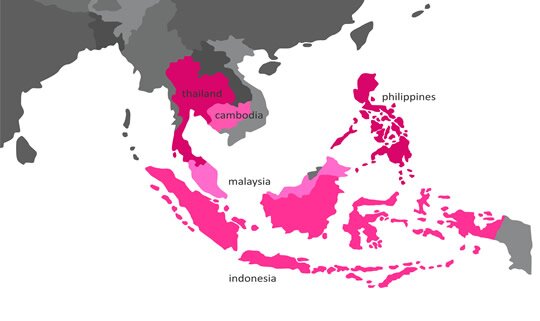
An Overview of Cambodia
Cambodia is without doubt one of the most exciting countries in SE Asia. Having endured hard years at the hands of the Khmer Rouge, the last 20 years of peace have brought significant developments to this land and its ever smiling people. Cambodia is located in the heart of the tropics, bordering Thailand, Laos and Vietnam and has is coastline on the Gulf of Thailand.

Cambodia, having been sleeping for many years is now fully awake and raring to go. Phnom Penh the country’s capital is a vibrant city , there are truly sophisticated bars, cafes, boutique and internationally branded hotels are moving in and though the city is fast becoming a modern metropolis, it is managing to retain its colonial charm, with the French influences still very apparent in the architecture, bakeries and wine bars of today.
There is a rising middle class of Cambodians benefiting from the country’s economic growth and foreign direct investment, this was clearly demonstrated by ANZ bank opening their first branch in the capital, Phnom Penh, in 2005 to meet the growing demand for mortgage finance amongst local nationals. And more recently, the banks have reported that in 2010 there was a 26% rise in cash deposits from the year before.
.jpg)
Economy
The Cambodian economy has been rapidly increasing since 2004 with garments, construction, agriculture, and tourism largely driving the growth. The Cambodian economy has been establishing itself as a reputable economy and recent GDP rates show how promising it can be with GDP for 2012 being 6.5%
Economically the country is a phoenix rising – foreign direct foreign direct investment (FDI) in Cambodia grew a whopping 73% in 2012 from the year before and the country is becoming Asia’s first choice for manufacturing companies. In particular, Cambodia’s garments industry grew by 32% in the first half of 2013 exporting $1.56 billion worth of garments and textiles - many fashion stores throughout the world now bear the label “Made in Cambodia”.
The low cost of land, labour and raw materials is giving Cambodia a real economic advantage over the traditional production hotspots such as Taiwan, Vietnam and even China..
.jpg)
Tourism
Tourism is also not to be overlooked, with a new airport in the coastal town of Sihanoukville allowing regional travelers the chance to enjoy Cambodia’s unspoiled beaches as an alternative to Thailand, Bali or Malaysia.
When one thinks of Cambodia, images of beautiful temples and a strong presence of culture and deeply embedded spirituality come to mind. Cambodia has a truly unique culture that has been influence by the French presence in the country, creating an idyllic east-meets-west ambience. The country is well known for its temples – the most famous being Angkor Wat however the attraction to Cambodia does not stop here, with beautiful beaches and large areas of unspoilt land, Cambodia is a truly stunning holiday destination.
In 2012 tourist arrivals increased by 24.4% compared with the previous year, with about 3.58 million foreigners entering Cambodia with revenue from the tourism sector totaling approximately $2.2 billion.
.jpg)
Just a few years ago, purchasing property in Cambodia would have been thought of as highly speculative, but these days with a stable, democratic government, 50% of the population under the age of 21, tourism steeply on the rise and a shortage of high end property in the capital, it’s a rare paradise for early bird investors. You read it here first!
Capital: Phnom Penh
Land size: 181,040 km2
Population: 15,205,539 (July 2013 est.)
Climate: Tropical, average temperature year round 32.5 degrees C, some rain in Nov/Dec
Economics: GDP rate for 2012: 6.5%
Tenure for foreign property purchasers: Leasehold, 99 years renewable
Availability of finance for foreign property purchasers: Commercial loans are available to foreigners buying property, but raising finance elsewhere where lending is more competitive might make more commercial sense.
.jpg)
|
|
